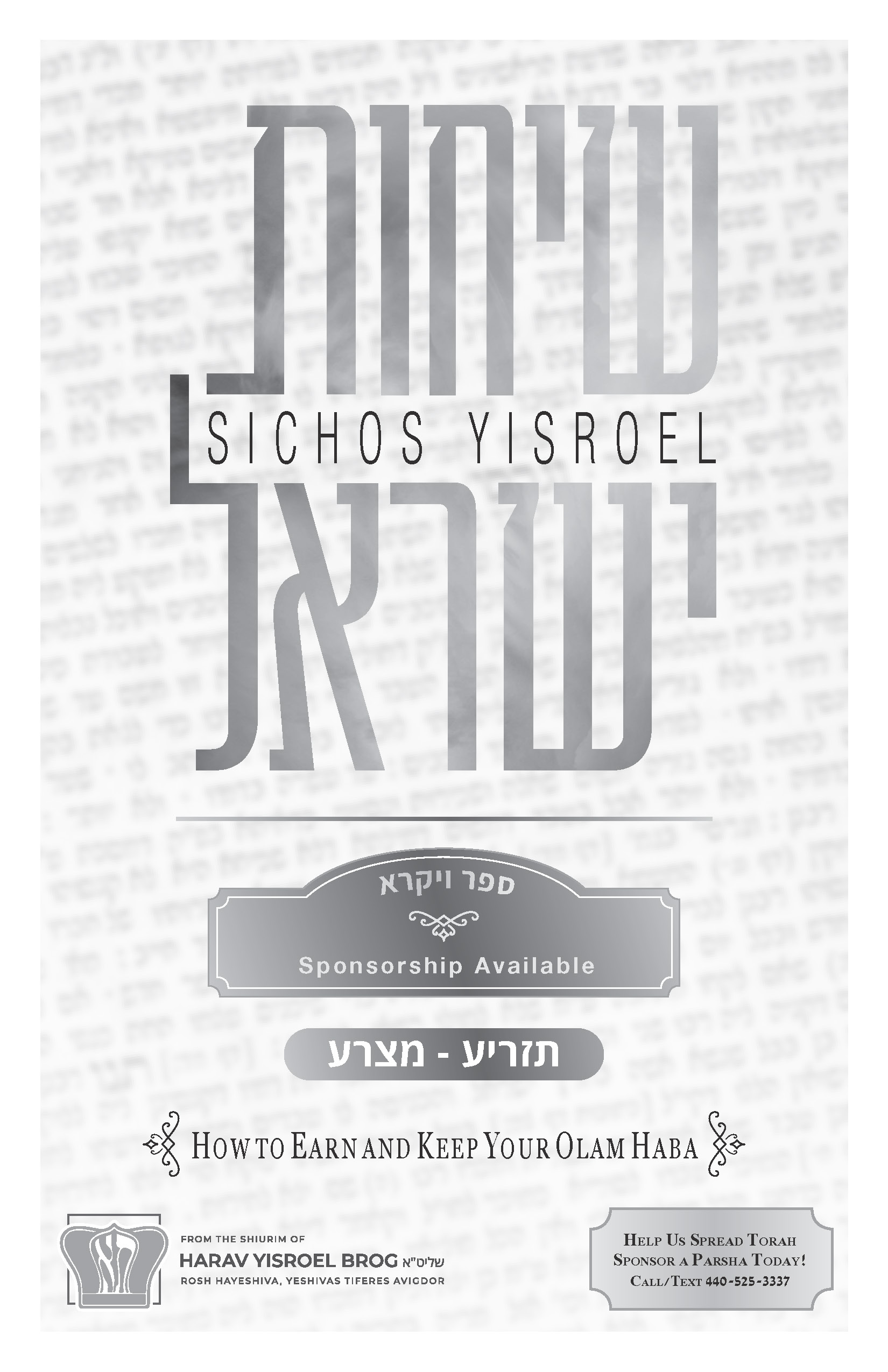Lech Lecha: Breaking Free From Your Surroundings
Sponsored
Do You Want the Zechus of Sichos Yisroel Distribution in all of Lakewood??
Sponsor Weekly Distribution!
Consider sponsoring a shiur
Visit YTATorah.org
Shiur given in 5779
The First Command of Avraham Avinu
The parshah begins with Hashem telling Avram:
וַיֹּאמֶר ה’ אֶל אַבְרָם לֶךְ לְךָ מֵאַרְצְךָ וּמִמּוֹלַדְתְּךָ וּמִבֵּית אָבִיךָ אֶל הָאָרֶץ אֲשֶׁר אַרְאֶךָּ
“And Hashem said to Avram, “Go forth from your native land and from your father’s house to the land that I will show you” (Bereishis 12:1).
The Ramban (12:2) comments on when the command of לֶךְ לְךָ was initially said to Avraham Avinu.[i] He says that initially, Avraham was in Ur Kasdim – that’s where they tried to burn him at the stake, and that’s where Hakodosh Boruch Hu found לְבָבוֹ נֶאֱמָן לְפָנֶיךָ, “his heart to be faithful.” After that episode, Avraham Avinu fled Ur Kasdim (the Ramban says: מפני שעשו אנשי אור כשדים עמו רעות רבות על אמונתו בהקב”ה, “the people of Ur Kasdim did him much evil on account of his belief in Hashem”), with the intention of going to Eretz Canaan, even before Hashem commanded him to go there. He went to Charan and was stopped there, and that’s where Hashem came to him and told him: lech lecha – “Leave from that place, and go do your avodah in Eretz Yisroel. That’s where your hatzalachah and brachah will come about. You will not experience the challenges of Ur Kasdim where they denigrated, cursed, and tortured you.” You see from Ramban that it’s obvious that when he was in Ur Kasdim, Hashem did not command him to leave from there; he left on his own. But when he came to Charan, that’s where Hashem’s command of lech lecha came to him. That’s why Rashi (12:2) wonders about the word מֵאַרְצְךָ (from “your land”), because he had already left this land (i.e., Ur Kasdim) with his father and had gone to Charan.[ii]
We All Have Avraham’s Nisyonos
Rashi says that Avraham was commanded to distance himself from Charan and leave his father’s house and to continue moving and leaving his father behind. This ציוי (command) of Hashem took place in Charan. But others, including Ibn Ezra and Pirkei D’Rabi Eliezer, say that the command to leave his land (מארצך) was already said in Ur Kasdim. But according to Ramban, as we just saw, leaving Ur Kasdim was Avraham’s personal decision because of all the suffering he endured from the locals, and the command of “lech lecha” came to him at Charan. This ציוי is the first command that Hashem gave Avraham Avinu, and everyone knows that based on the principle of מעשה אבות סימן לבנים (Ramban, 12:2, based on Midrash Tanchuma, Lech Lecha 9), this means that we will also have the nisyonos that Avraham Avinu had of leaving his land, his birth place, and his father’s house.
While most people don’t think that they have this nisayon of מֵאַרְצְךָ וּמִמּוֹלַדְתְּךָ וּמִבֵּית אָבִיךָ, the emes is that this nisayon is chai v’kayam, and most people fail in it. Some people don’t even struggle with it, and some struggle and then fail in it.
Rabbeinu Bechaya (Bereishis 12:1) brings a passuk from Mishlei (13:20), הוֹלֵךְ אֶת חֲכָמִים יֶחְכָּם וְרֹעֶה כְסִילִים יֵרוֹעַ, “He who keeps company with the wise becomes wise, but he who consorts with fools comes to grief.” Shlomo HaMelech warns us how a person has to try to be in the company of chachamim and distance himself from the company of fools. They are not rishaim; they are just plain fools. The word הוֹלֵךְ implies something you do on a continuous basis. You attach yourself to them, you become tofel – you become incidental to them, and give them positions of leadership and look up to them. Someone who has this middah and hangs around chachamin, will undoubtedly become a chacham. And someone who hangs around and attaches himself with fools will become broken.[iii]
He further says that Hakodosh Baruch Hu came to Avraham Avinu because the men surrounding him were fools: his father was an absolute fool because he worked for Nimrod, and he himself worshiped avodah zarah. Chazal tell us that Terach, instead of keeping his mouth closed, went and snitched on his own son to no less than Nimrod. He knew that they weren’t going to give his son shlishi for that! He knew it was a very dangerous thing to say, “My son mocks what you are worshiping.” And therefore, Hashem told Avraham Avinu, התרחק מהם ואל תתלכלך עמהם, distance yourself from them and don’t become “dirtied” by these people. “Leave this land, leave beis avicha. Goodbye.” ויאמר ה’ אל אברם לך לך. Chazal tell us that Avraham was compared to לצלוחית של פליטון הנתונה בבית הקברות, a jar of beautiful perfume that was placed in a smelly graveyard. No one there was able to appreciate its beautiful fragrance there. So what did the people do? They took the jar out from there and placed it among the people in a metropolis, and then its beautiful smell became known to the world. So, too, Avraham was living with the ovdei ovodah zara, and Hashem told him, לך לך – התרחק מהם ואל תתלכלך עמהם, “don’t become dirtied from them.”
Now, listen to this beautiful explanation of Rabbeinu Bechaya as to why the Torah uses the lashon of “לך לך.” What kind of term is לך לך? Why couldn’t the Torah just say לך מארצך? Rabbeinu Bechaya says that the Torah is telling us clearly that the reason Hashem told him to leave was in order that he should not be תתלכלך – dirtied and soiled – by these foolish and wicked people. This is one of the ten nisyonos that Avraham was tested with, and he withstood them all.[iv]
Even Avraham Avinu Can Be Affected!
A very important message lies here. Now, the emes is that if you look at how the Torah states this command, you see that the Torah says, “leave your land,” followed by “leave your birthplace,” and finally, “leave your father’s house.” This order seems not to be sequential.
As we know, when a person goes out, he first first leaves his father’s house, then he leaves the place where he was born, and then he leaves his land. Why does Hashem tell Avraham to leave in this order? The answer is that the purpose of this trip was not so that Avraham Avinu should travel and become a “wandering Jew” and just teach people about Hashem. Hashem wanted him to get rid of the לכלך, the shmutz. Avraham Avinu grew up in a house of “shmutz,” as many people do. He grew up in a city and a country of “shmutz.” The most powerful influence a person has in his life is his family; next in line is his city (i.e., his surroundings, friends, relatives, and associates), and then the last influence is his country. These are factors that impact a person’s thinking, so Hashem told Avraham Avinu to first leave his land – that’s the easiest thing to get away from – the לכלך of your land. Then He told him to get away from the לכלך of his city. And then, finally, He told him to get away from the לכלך of his family – the hardest thing to get away from. The amazing thing, as my Rebbi (Rav Meir Soloveichik, zt”l) pointed out, is that Avraham Avinu, at this point in time, was a giant! He had rejected all avodah zarah against the whole world! He was Avram HaIvri – the most powerful man in the history of the world! He stood up against the whole world and was seemingly not affected by all of that. It is unbelievable! Yet, regardless of that, Hashem told him, “As great as you are, it’s important for you to keep moving and get away from the people you were surrounded by in your past because otherwise there’s a tremendous danger of you still becoming תתלכלך from them.” That’s what a person has to know! Who was Avraham Avinu? The greatest of the great. Seemingly, the most protected and guarded man in the world, to whom Hashem said: לֶךְ לְךָ.
A Yeshiva Dinner Invitation That Raised Eyebrows
Sadly, we live in a world where I constantly see this challenge. I see people in America who have American shittos, philosophies, the filth, the shmutz, the krumkite of American life. There are no values that are further from the Torah than you have in this country. I will give you an example. Someone called me recently to say that he was invited to a yeshiva event where a famous congresswoman would be honored as a keynote speaker. When I asked what she is famous for, he told me that she is famous for being the first Republican congresswoman to vote for a toevah marriage, and she herself is in such a marriage, without hiding it at all. She even publicizes it all over the place. So the guy asked how he should respond to this invitation. I said, “This is not a yeshiva, it’s not a Rosh Yeshiva, it’s garbage, and if they don’t see that, then they must have lost their minds.” He said he emailed them to ask why they are doing it. Probably for money. But are you allowed to flatter aza public rasha?! You have to be so twisted to accept that invitation! This congresswoman is very famous for taking a certain neighborhood in that state and turning it into an adult playground of the worst kind! That’s her ‘gadlus’! And a yeshiva of all places, the yeshiva hagdolah v’kadoshah, is honoring her at their annual dinner! Unreal! Now, most people might say, “So what? What difference does this make?”
Rabbi Miller’s Providential Stance
I remember that my Zeide (Rav Avigdor Miller, zt”l) was invited to a dinner where another Mr. Toevah was honored. He happened to be the mayor of New York, and he was Jewish. My zeide hired buses and he told all the people in the synagogue to get on the buses and he said, “We are going to protest! We are standing up for Hashem!” I remember back in the day, a Rosh Yeshiva told me, “What is your zeide all upset about? Who cares about these toevah people? It’s never going to affect or impact any of us!” So I asked my grandfatherand he said, ”No, these people will impact us. They will come to work in our yeshivos and the yeshivos are going to have to take them. You are going to rent apartments and houses to them. You are going to have to respect them, and anyone who doesn’t realize this, is short-sighted, and doesn’t begin to see where this is leading. One day in America, there will be a shivyon, an equality, where you’ll be required to treat these people equally, like everybody else. And instead of calling these people for what they are, as nebach, sick people, we will one day have to respect them and bend our knee to this movement.” And it mamish turned out like he said nowadays! Every single word he said came true! If you look at the world today, the world has gone nuts! That Rosh Yeshiva was a European Rosh Yeshivah and when he came to America, he became התלכלך – influenced by the filth of America. That’s very sad.
How Does a City or Country Affect You?
Now, the big problem is that most people identify with their country’s hashkafa and they don’t realize exactly how it affects them. The main way how the country’s and city’s hashkafa affects a person is when a person seeks relaxation or entertainment. People seek entertainment in this world, whether it’s kosher or not – and it’s completely impacted by America, or any other country where they happen to live. A number of years ago they started “Kosher” cruises. Now, a cruise is the antithesis of Torah entertainment! I mean, this is such nonsense! It’s so far away from Torah. I’ve spoken to many people who’ve gone on cruises. One of my talmidim once went on a cruise and told me afterward, “Do you know who was on the cruise with me? A Rosh Yeshiva!” It happened to be the same Rosh Yeshiva who honored that congresswoman. I am telling you! I remember I asked him, “Are you sure it was him?!” He said, “Yeah.” I asked him, “How many Yidden were on that cruise?” He told me, “Five hundred.” “So it was a Yiddishe boat,” I told him. “No!” he told me. “There were 2,000 people on that cruise, and 500 were Jewish.” I said, “Nu, did they have minyanim?” “Sure, they had minyanim,” he said. But to get to the minyan, which was in the back part of the boat, you had to go through such shmutz – it was unbelievable.” I asked him, “Are you sure there was no other entrance?” He said, “Yes. I went with the Rosh Yeshiva himself!”
Pashut, people don’t even chap that this is not a Yiddishe zach. I asked him, “What do people do all day long on these cruises?” I clearly understood from him that you sit and you are מסתכל b’arayos on the deck all day long. You drink unlimited alcohol all day long. These people are walking around shikurim all day long. The ship charges your card, and they make money on you left and right over there. People are gambling. They have casinos and movies open throughout the day! Basically garbage all day long. Now, please tell me – is this a Jewish zach?! I remember how the state of NY, at some point, started kosher cruises, and there was a nice Rav who fell into the trap. He was someone I respected. He became the “kashrus” face of these cruises. You went down to Manhattan after work, you met your cruise company, and you went cruising in the bay, with music, with glatt kosher chassidishe food. Most people don’t realize how non-Jewish that is! And you know what the sad thing is? Most people think there’s nothing wrong with it! Most people think: “If you can afford it, why not?” This is twisted thinking! That’s how far they are from Torah. They don’t begin to know the musag of what it means to be Jewish.
The Most Difficult Place to Leave
But the most difficult struggle is with the family; the בֵּית אָבִיךָ is the hardest thing to leave. It’s a major challenge for a person who grew up in a home without Torah values, and even more so if there was a total and blatant negation of those values. If a person comes from a family where they don’t cover their hair – that’s a blatant declaration of a rebellion against the Torah. Is this where you want to bring your kids?! And I don’t care if it’s your mother, I don’t care if it’s your grandmother – you are not allowed to make a brachah in front of that person. It’s assur. “But I am the mother!” What difference does that make? In front of your wife you can’t do it either! And what if they have televisions in all their rooms, like a lot of these people do? And you bring the eineklech,and they get “educated,” and the grandmother says, “Let them enjoy themselves! What’s the problem?! What are they watching already?! A bissle jokes? What’s so geferlech already? What are you being such a fanatic for? You yourself grew up like that, and you turned out pretty good!”
You can’t imagine the “torahs” these people have. It’s a tremendous challenge. And what if you have a family member who’s against limud HaTorah? You have a family who are anti-Torah, and you bring your children there to expose them to such attitudes? You have an uncle or an aunt who always talks against bnei Torah, how bad they are, how terrible they are, how they are parasites, how they are not self-sufficient. Are you going to go to that family?! That’s the same thing as Terach’s family! I don’t care if they keep Shabbos some of the time. If you get near them, you will get תלכלך, you will getfarshmutzed! That’s where the biggest nisayon is. “Lech Lecha,” the Torah says – if you want to get anywhere in life, the first nisayon in life is – you have to move away from the negative influence.
Yes, Your Kid Knows Your Passwords
I will tell you what the biggest problem is today; I’ve dealt with this problem many, many times, for sure. A boy goes home to his family, and his family has a computer: in the living room, in the dining room – wherever they put it. I remember one specific story where a bachur told me, “Rebbi, I can’t go home. There are computers there. I am nichshal every single time.” I told him, “Why don’t you tell your parents?” He said, “They don’t understand.” I called up his mother and said, “Do you understand that young men are challenged with this?” She said, “Oh, yeah. I have a couple of boys already, and one of them had a big problem with it.” I said, “You know, your dear son is struggling with this now.” She says to me, “No – he’s not that type!” I didn’t want to tell her that I caught him with his cell phone, and the shmutz that was on that cell phone! I said, “You know, your son would really like you to keep him safe.” She said, “Rabbi, I don’t understand why you keep bothering with this stuff. Our laptop has a password.” I come back to the bachur and say, “Your mother says she has a password.” He tells me, “My mother and father together have ten passwords on different programs, and let me tell you what they are.” I wrote them all down on a piece of paper, and then I called his mother back. I said, “Excuse me, is this familiar to you? EAX232…” She said, “Hey, that’s my password!” I said, “Excuse me, is this familiar to you, too?” I gave her all the passwords. She exclaimed, “Rabbi Brog, what are you doing? Are you hacking me?” I said, “This information was given to me by your dear son.” She said, “Oh my! He knows all my passwords?!” I said, “I am sure that every time he asks, ‘Ma, how do I get on?’ you tell him, ‘Oh, no problem, let me tell you how to get on.’” She said, “But the computer is in a private room.” I wanted to tell this lady, “How stupid can you be, lady?”
Visiting Bubbie and Zeide Isn’t So Simple
Or let’s say a guy goes to his zeide or bubbie, and asks them, “Zeide, Bubbie, can I go see something?” They ask him, “So what are you going to see there? Better not.” He says, “Ah, nothing bad, of course, maybe just some sports.” Yeah, what he calls “sports” and his zeide calls “sports” is einam maise! You pashut just sold your kid down the drain. Family – this is the first nisayon, my friends. The biggest mitzvah the secular people have is the family – mishpacha. You’ve got to do for the mishpacha! And I’ve told a lot of people this, “You want to know what the Torah says about the ‘mishpacha’? Lech Lecha! That’s what Torah says about the ‘mishpacha’. Avraham Avinu didn’t want to run away from his father, even though his father was Terach. It was his family, and he had respect for his parents! But Hashem told him, לך לך מבית אביך.” You’ve got to understand that this is a very, very big nisayon.
An Unforgettable Lesson of the Chofetz Chaim
Let me tell you a story that my Rebbi related to me. The uniqueness of this story is that he said it with extreme precision regarding all the details. That’s how he said these stories. One time, one of Chofetz Chaim’s relatives came to Radin. This person was associated with the Mizrachi movement, but he wasn’t out to get Yiddishkeit, he wasn’t להכעיס. It was b’tmimuso – he just didn’t understand better. But sof sof he became a Mizrachnik. The Chofetz Chaim was mekabel him in his house, and all the bnei yeshiva came to Chofetz Chaim’s house to see how he would talk to his relative and what he would say to him. The Chofetz Chaim turned to the talmidim and said, “Kinderlach, gey avek fun da” (go away from here). Listen to what he said: “Azo shtein – lebben blotte, machmen zich ain” (if you stand next to mud, you get dirtied). But he didn’t stop there. He said, “If you take a shteyn, a stone, and throw a stone into a blotte, you will get sprinkled with dirt, geitz lernen – go learn,” he said.
He said, “Even though Avraham Avinu was already mekadesh shem shamayim, if he would have been among the chevras risha’im, he would have been negatively affected.
Now, there are ways to deal with this – invite them to you, don’t go to them, and don’t let it be on a daily basis. Over the years, parents called me and complained about why I was teaching their kids such “foreign ideas.” And I would tell them, “I am very sorry, but these are Torah ideas. They may be foreign to you, but do you know that this was the first test of Avraham Avinu and Hashem told him that he would be influenced if he associates himself with these people.” One mechutzaf said to me, “I am sure there’s another way to learn this pasuk that would be a raya to me!” It’s amazing.
“Don’t Mess Up More of My Chassidim”
There were a number of Yiddishe representatives in the Polish parliament who were spokesmen for the frum community. Among them were two chassidishe yungeleit, and the askanim wanted to get two more chassidim. The askanim came to speak to the rebbe of these chasidim to ask if he could choose another two representatives to send. So the Rebbe got upset with them and said, “Is it not enough that you messed up two of my chassidim, you want to mess up another two chassidim? I am not giving you reshus. Even though they will fight for Yiddishkeit, it’s pogem, it’s מלכלך.”
When I went into kiruv many years ago, my Rebbi warned me about this and asked me, “How come you are not afraid? You are not afraid to find yourself in the company of these kinds of people?” So I asked my zeide about this, and he told me, “You should know, I am a tough nut, and I even cracked a bit when I became the rabbi in Young Israel.” I asked him if he could give me some guidelines, and he did. He gave me a bunch of guidelines. He said: “Never go down to their level to become their friend. Never go to them – let them come to you. Be rooted in a yeshiva – you have to protect yourself as much as you can.” He said, ”Remember the passuk (Mishlei 24:21), עִם שׁוֹנִים אַל תִּתְעָרָב – ‘Do not mix with people who are different than you.’” The Gemara (Sotah 22a) says that this refers to someone who knows Mishna and Chumash – a person who knows Mishna should not mix with someone who only knows Chumash because he’s going to bring him down! I thought about that, and I said, “If you look in the passuk, it says, אַל תִּתְעָרָב. You know what a tauruves is? Tauruves is a mixture. For example, if you have meat and potatoes on a plate and you see the meat is here and the potatoes are there – that’s not called tauruves. A tauruves is when you have a mixture, and you can’t identify the meat or the potatoes. It looks like one mixture. So when it says, עִם שׁוֹנִים אַל תִּתְעָרָב, what it means is, don’t become mixed to the degree that no one can tell the difference between you and them. There has to be a clear line of demarcation that points to who’s the ba’al mishna and who’s the ba’al mikra. So a person has to push himself to hang around people who are ba’alei aliya.
Hanging Around People In Growth Mode
I notice it’s the same thing in the yeshiva world. In every group setting, it’s the same dynamic. People who want to grow will be attracted to others who are in growth mode on a higher level.
People who are not growing should be avoided like a plague! People who are not interested in growing only hang around with the lowest element, people who have no interest, no taivah to grow, to go anywhere in life, to yearn, to shteig, to learn, to grow in Yiras Hashem and Avodas Hashem. Gornisht! Birds of a feather flock together. Someone told me, “I never heard that I can hang around such a person and learn from them!” I showed this person someone who’s a ba’al aliya and he said, “Him?! Nah! He’s too frum! He’s too much!” הוֹלֵךְ אֶת חֲכָמִים יֶחְכָּם וְרֹעֶה כְסִילִים יֵרוֹעַ, “He who keeps company with the wise becomes wise, but he who consorts with fools comes to grief” (ibid). By hanging around כסילים you will become a broken person, a nobody. You sit around with these people and you talk nonsense, shtusim and havalim, and it’s about taivas and cheftzei haguf, so you become a rasha.
Rabbosai, a person has to protect himself, his family, his children. Of course, you can’t be aggressive about it. You have to know how to do it. You have to know how to do it in a wise and tactful way, and how to tiptoe softly around many of these sensitive issues. But you have to realize you can’t make everybody happy. “I don’t know why you cannot come to this event!?” “You know why? Because you invited a cousin who is married to a goy!” “Oh, is it that bad?! What’s the problem? They are such nice people! They are very respectful! The non-Jewish guy is very nice, he’s more respectful than even the frumme!” That’s what I hear all the time. That’s fine, but we cannot accept that. And what if you have grandparents who are blatantly mechalel Shabbos and the entire Torah? This is who you want your kids to be exposed to? “But we look up to them! We train our children to look up to their grandparents!” Rabbosai, you have to even learn how to train your kids from eventually saving their own kids, לך לך מארצך וממולדתך – and even מבית אביך.
The Bottom Line
We learn from Avraham Avinu how important it is to protect ourselves and our families from outside influences. Chazal say מעשה אבות סימן לבנים – we have to face the same nisyonos that Avraham Avinu faced. Avraham Avinu had to leave his land, his place of birth, and his father’s house because Hashem wanted him to stay untainted by negative influences. Similarly, Shlomo HaMelech warns us that a person should stay in the company of chachamim and distance himself from the company of fools because we will be influenced. Being extra cautious applies to all of us – including simple and great people. By the time Avraham left, he was already a very great tzaddik, he was Avraham HaIvri. Nevertheless, Hashem told him to leave so he would not be influenced by the people. How can we honor impurity and sinfulness since it will lead to terrible influence? We can’t risk condoning sin nor be influenced by it. Therefore, we must be on guard to maintain a safe distance, even protesting sinfulness where possible. We are at such risk of being worn down by our surroundings that we don’t even realize that certain things we see around us are against the Torah hashkafa (such as luxury cruises). The greatest struggle is when there is negative influence from our own wider family. Children learn from their surroundings; for example, they catch on very quickly to new technology whenever they are exposed to it. Whereas ‘family’ and connecting is the greatest ‘mitzvah’ for secular people, the Torah says if ‘family’ comes together with negative family influences, we must be prepared to move away, even though it is a huge nisayon. If, for example, we work in kiruv, we must always follow guidelines to protect our own essence so we don’t get pulled down. Otherwise, we could end up ‘talking their talk.’ The moves we make in order to protect ourselves from negative influences should be done non-aggressively while firmly upholding what the Torah says. Hopefully, b’siyatta diShmaya, we will also pass the test as well as Avrham Avinu did. This week, I will (bli neder) think about what things in the environment of my immediate family could be risks and anti-Torah influences. I will take steps or speak with my Rav to understand what steps I can take to protect my family.
[i] והיה ברכה אתה תהיה הברכה אשר יתברכו בך לאמר “ישימך אלהים כאברהם” והוסיף עוד כי כל משפחות האדמה יתברכו בו לא אנשי ארצו בלבד או ונברכו בך שיהיו מבורכים בעבורו והנה זאת הפרשה לא בארה כל הענין כי מה טעם שיאמר לו הקב”ה עזוב ארצך ואיטיבה עמך טובה שלא היתה כמוהו בעולם מבלי שיקדים שהיה אברהם עובד אלהים או צדיק תמים או שיאמר טעם לעזיבת הארץ שיהיה בהליכתו אל ארץ אחרת קרבת אלהים ומנהג הכתוב לאמר התהלך לפני ותשמע בקולי ואיטיבה עמך כאשר בדוד ובשלמה וכענין התורה כולה אם בחוקותי תלכו (ויקרא כו ג) אם שמע תשמע בקול ה’ אלהיך (דברים כח א) וביצחק אמר בעבור אברהם עבדי (בראשית כ״ו:כ״ד) אבל להבטיחו בעבור יציאת הארץ אין בו טעם אבל הטעם מפני שעשו אנשי אור כשדים עמו רעות רבות על אמונתו בהקב”ה והוא ברח מהם ללכת ארצה כנען ונתעכב בחרן אמר לו לעזוב גם אלו ולעשות כאשר חשב מתחלה שתהיה עבודתו לו וקריאת בני האדם לשם ה’ בארץ הנבחרת ושם יגדל שמו ויתברכו בו הגוים ההם לא כאשר עשו עמו באור כשדים שהיו מבזין ומקללים אותו ושמו אותו בבור או בכבשן האש ואמר לו שיברך מברכיו ואם יחיד מקללו יואר וזה טעם הפרשה אבל התורה לא תרצה להאריך בדעות עובדי עבודה זרה ולפרש הענין שהיה בינו ובין הכשדים באמונה כאשר קצרה בענין דור אנוש וסברתם בעבודה זרה שחדשו:
[ii] מארצך. והלא כבר יצא משם עם אביו ובא עד חרן אלא כך אמר לו התרחק עוד משם וצא מבית אביך
[iii] שלמה המלך ע”ה יזהיר בפסוק הזה (משלי יג) על אדם להשתדל בחברת החכמי’ ולהתרחק מחברת הכסילים, ואומר הולך שהולך אחריהם תמיד ומתחבר אליהם ועושה עצמו טפל להם, ונותן אותם עליו אלופים לראש, מי שיש לו מדה זאת אין ספק שיחכם, והמתחבר עם הכסילים שיהיה הוא להם ראש ירוע, כלומר ישבר, והנה הפסוק מבאר הנזק המגיע מחברת הכסילים והתועלת המגיע לאדם מחברת החכמים, כי זה ישבר וזה יחכם, וידוע כי המתחבר אל החכם יהנה והחכם אינו חסר כלום, וע”כ נמשלה התורה לנר, כענין שאמר דוד ע”ה (תהילים קי״ט:ק״ה) נר לרגלי דברך ואור לנתיבתי, לפי שהנר הכל מדליקין ממנו ואין אורו חסר כלום, וכו’.
[iv] והנה אברהם אבינו ע”ה רצה לקיים ענין התורה והעבודה, וכמו שדרשו רז”ל קיים אברהם אבינו אפילו ערובי תבשילין, והוצרך להזהר מחברת אנשי דורו הרשעים שהיו סבה לבטול הבחירה, וע”כ בא אליו דברי הש”י שיתרחק מהם ואל יתלכלך עמהם, ושילך מארצו וממולדתו אל הארץ אשר יראנו. וזהו שכתוב ויאמר ה’ אל אברם לך לך מארצך וממולדך ומבית אביך אל הארץ אשר אראך, ודרשו רז”ל היה דומה אברהם לצלוחית של פליטון הנתונה בבית הקברות ולא נודע ריחה מה עשו נטלוה וטלטלוה ממקומה והודיעו ריחה לעולם, כך היה אברהם דר בתוך עובדי ע”ז א”ל הקב”ה לך לך, התרחק מהם ואל תתלכלך עמהם, וזהו שתפש לשון לך לך, והנה זה מעשרה נסיונות שנתנסה אברהם ועמד בכולן שלם, וזהו הראשון, והאחרון הוא ענין העקדה, ונא’ בלשון הזה עצמו ולך לך אל ארץ המוריה כדי להשוות האחרון לראשון, והדבור הזה היה בחרן כי הוא ארצו ומולדתו ועליה אמר אברהם (בראשית כ״ד:ל״ח), אם לא אל בית אבי תלך וגו’, ובוודאי זה היה נסיון גדול שילך מארצו וממולדתו שנולד בה ואשר ישב בה מאז ושם כל משפחתו ובית אביו, אל ארץ לא ידעה. ודע כי קודם שיזכיר הכתוב ויאמר ה’ אל אברם היה ראוי להודיענו מעלותיו ומדותיו כדי שנכיר מי הוא ואחרי כך יזכיר הדבור כי כן עשה בנח, אבל י”ל כי כבר גלה לנו הכתוב בפרשה של מעלה על מעלתו הגדולה ברמז במלת אור כשדים כמו שנתבאר שם.






